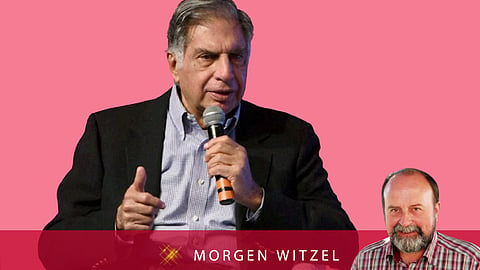

A titan has left us.
Although Ratan Tata never had the reputation outside of India that he should have had – and richly deserved – he was the dominant figure in Indian business for more than three decades.
Like many great leaders, he did not at first aspire to a position of leadership. He once said that in a perfect world, he would have become an architect.
Nevertheless, as JRD Tata's leadership of the Tata Group drew to its close in the late 1990s, it was clear that Ratan was the only obvious choice to succeed him, the only man who could hold the group together. The "satraps" who aspired to succeed JRD were divisive figures, but Ratan was a unifier.
His first real test as a leader came when he was appointed as chair of TELCO, later Tata Motors, at a time when a vicious strike had brought the Pune plant nearly to a halt. Ratan's method of resolving the strike was typical of his later leadership style.
He went down to the shop floor, talked to the few remaining workers, listened to their grievances and promised to do his best for them. These workers talked to their striking colleagues and told them that Ratan was a leader they could trust. Gradually, the strikers began returning to work, leaving the leaders of the strike isolated.
"Leadership with trust" was one of Ratan's values, and he did his best to live by it.
Following the collapse of Tata Finance in 2001, he famously promised that every investor and depositor would get their money back; no one would lose a single rupee. Eight years later, I asked him if he had known at the time how much money Tata Finance had lost, and how much the Tata Group would have to pay back. His answer was startling.
"No," he said calmly. "I had no idea. In my mind, I was prepared to liquidate the entire group, sell off every asset we had, in order to pay that debt. We had to do this."
I asked him why. "Because if we had not, no one would ever have trusted us again," he said. "And everything we have worked for would have been thrown away."
Trust, reputation – and yes, pride – were far more important in his book than money.
I had the privilege of meeting Ratan Tata twice, including conducting a lengthy interview with him in 2009. I was struck by how unassuming he was, quite unlike the "great man" leaders who populate our history books. His leadership style was rarely directive. He told me that he never gave orders to the chairs of the various companies within the group, because he believed he did not have the right to do so.
His approach, he said, was to "cajole" his executives, explaining his own position patiently and waiting for their response. Humourously, he said that he thought they probably went along with him because they got tired of listening to him.
And yet, when the values and reputation of the Tata Group were threatened, he could put his foot down. The Cyrus Mistry affair is a good example of this. Ratan clearly felt that some of Cyrus Mistry's actions were not in line with the Tata values, and tried to perusade him to step down. When Mistry refused, Ratan fired him.
People took sides in the dispute (and still do) and the resulting lawsuits and general chaos probably did the group's reputation no good. To me, though, there was a clear point of principle here. The board of directors employs the executive head of the organisation, and if the head takes decisions that the board believes are not in line with its values, they have the right to dismiss him. Whatever you think of the decision, there can be no doubt that Ratan Tata was once again living his own values.
He was not perfect. Not all of his ideas worked out. The Nano microcar, one of his favourite projects, looked great on paper but made little impact on the market. This did no harm to Ratan's reputation, though. Failure the Nano may have been, but everyone knew the intentions behind the project, and respected his sincerity. One of the marks of a great leader is to emerge from failure stronger than before, and Ratan Tata had that quality.
I have interviewed many CEOs and other leaders around the world, and Ratan Tata remains one of the most impressive I have met. His achievements in expanding the Tata Group's size and global reach are a matter of record.
His style of leadership, modest and unassuming, patiently "cajoling" and persuading people, showed that leaders do not have to be loud, brash or bullying. Patience and sincerity and, above all, trust, are at the end of the day far more effective. He was a talented leader, a compassionate man and a gentleman in the truest sense of the word, and we shall not see his like again.
(Morgen Witzel is a writer, management historian and has taught at the London Business School and more recently at the Exeter Business School. He is the author of Tata : Evolution of a Corporate Brand.)